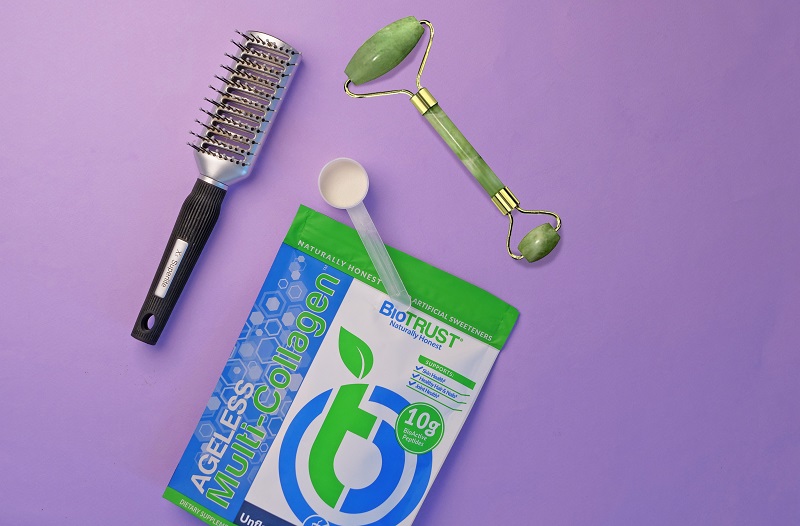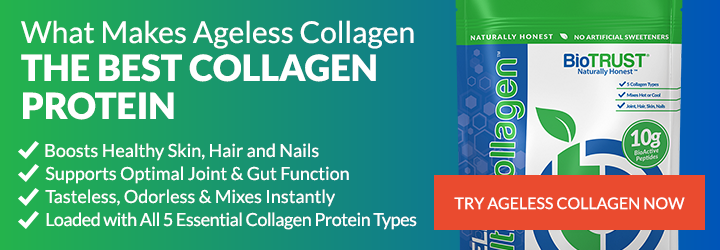Does Collagen Really Help for Hair Growth?

There are so many exciting claims for collagen products: they’re touted to help plump the skin, promote a more youthful glow, and help reduce signs of aging for the skin. Research suggests collagen can help support connective tissue for healthier joints. And it’s also hyped as one of the best things you can do for healthier, shinier, thicker, more beautiful hair. But, do the collagen for hair claims live up to the hype?
For a quick reminder, collagen is the most abundant protein in the body. It’s the glue that holds us together as a fibrous, supportive protein. It makes up bones, tendons, cartilage, ligaments, and skin. It’s needed for cushioning joints and plumping the skin.
And as we get older, our bodies produce less collagen. In addition, many of us are exposed to environmental stressors that also decrease production, such as excess sun, smoking, pollution, harsh chemicals from cleaners, high-refined-fat and high-sugar diets, and excess alcohol consumption.
Less collagen in the body becomes more noticeable over time as the skin begins to wrinkle and sag, the joints become less flexible, and the hair starts to thin, look dry, and begin to gray.
No wonder collagen sounds so appealing!
Collagen for Hair Growth
Admittedly, the research on collagen’s benefits for hair is a bit more sparse than for some of the other positive effects (e.g., joint, skin, and gut health). But there is some intriguing research on potential benefits, such as:
1. Collagen may support hair growth: Hair is made up mainly (95%) of the protein keratin, rather than collagen. So, if collagen isn’t the protein found in hair, why would it help with hair growth? Because, it turns out, the body uses amino acids from collagen, especially proline, to build keratin. 1
One small study with 40 women found that those who used a collagen supplement over 6 months experienced more hair growth than those given a placebo. 2 However, the supplement also contained other herbs as well as keratin, so it’s unclear how much benefit the collagen provided. More research, in other words, is needed.
2. Collagen may help protect follicles: Acting as an antioxidant, collagen may also help fight free radical damage from stress, pollution, high-fat and high-sugar dietary choices, excess alcohol, and other environmental impacts. Research has found that free radicals can harm hair follicles, especially as we age. 3
Studies, specifically with marine collagen, have demonstrated collagen’s potent antioxidant activity. 4, 5 One laboratory animal study found that marine collagen was even more effective in fighting free radicals than well-known tea polyphenols. 6 Again, more research is needed, but these studies suggest intriguing potential.
3. Collagen may prevent age-related hair thinning: As mentioned above, our bodies naturally produce less collagen as we get older. This can decrease the strength and elasticity of the skin, namely the dermis, which is the middle layer of skin. This layer is also where hair roots are found. 7
Over time, as the dermis ages, the hair gets thinner. So theoretically at least, providing more collagen to the body may help protect this layer and thus help decrease the thinning of hair that often comes with increased age. 8 While there is research showing that collagen may support skin health and elasticity, 9, 10 unfortunately, there is not yet research showing how effective collagen is in helping prevent age-related hair thinning.
4. May reduce graying: Graying hair is just the loss of pigment that determines hair color. As we age, we naturally lose pigment. The amount and timing of hair turning gray is mostly determined by genetics (how soon did your parents or siblings go gray?), but free radical damage also appears to play a role. 11, 12
Laboratory test tube studies, for example, have found that gray hair follicles have lower antioxidant activity than pigmented hair. So, in theory, consuming more antioxidants, such as those found in collagen, may help decrease the risk of premature graying or potential slow age-related graying. 4,5 Again, however, there isn’t quite enough research.
Collagen for Hair: A Recap
While there isn’t enough research on all the beneficial effects of collagen for hair, it does provide the amino acids to build keratin, it helps fight free radicals that can lead to skin and hair follicle damage, and it’s easy to add to your daily diet. Plus, anecdotally, there are lots of glowing reviews on how collagen helps hair become thicker, healthier, and more beautiful.
What’s more, research indicates collagen may provide many more benefits, including improved skin, joint, and gut health.
Supplements are an obvious solution, yet you may also help your body naturally produce more collagen by eating foods that are high in vitamin C, zinc, copper, and manganese. Good sources include vegetables, fruits, nuts, and seeds.
Other nutrients that may help support hair health include:
- Silica, which may help hair look stronger, thicker, and brighter. 13
- Vitamin E, which appears to help hair both when applied and consumed. 14
- Omega-3 fatty acids, which may support hair and skin health, especially when consumed with other antioxidants. 15
In addition, cutting back on sugar, avoiding overexposure to UV sunlight, and taking steps to decrease exposure to pollutants may also help.







